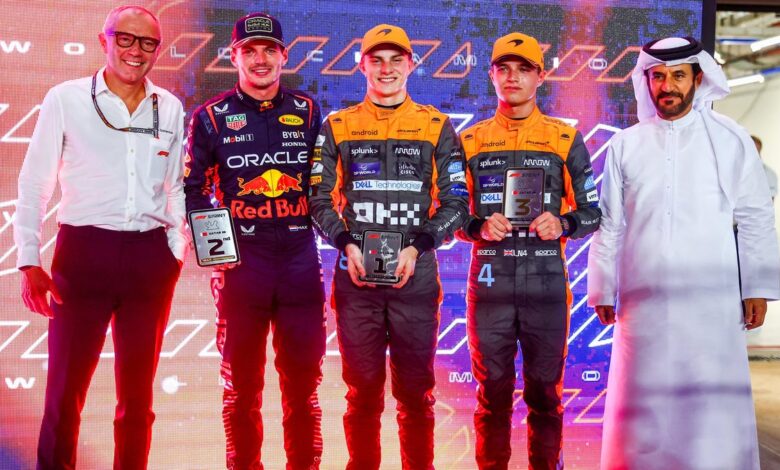FIA President Mohammed Ben Sulayem

Speak to FIA President Mohammed Ben Sulayem just once, and your opinion of him will change: It was a refrain I heard several times after Jalopnik was invited to join two other publications in an intimate round-table with the head of international motorsport. Bombastic and passionate (though he would likely disagree with both characterizations), Sulayem didn’t hold back when answering questions; it became clear that, with him at the helm, the FIA could easily become a great champion of Formula 1’s growth in America — but it was as equally clear that there’s still room to grow.
The journalists were invited to get comfortable before Sulayem entered his own office bearing a small stack of papers that bore brief descriptions of each journalist in the room: our names, our coverage angles, and our publications. He greeted each of us by name and firm handshake before he took his seat and launched into his first topic: How to better organize the F1 calendar.
“The best solution, I believe, is arranging the calendar better to take account of climatic conditions and the general well-being of all the people working in F1,” Sulayem said, referring to the previous weekend’s dramatic heat in Qatar. “We have to consider the fatigue of the staff. Twenty-three races, that causes a lot of fatigue. What if they make a mistake due to fatigue? It can have a negative impact on all of us.
“And who’s to blame? It’s always the FIA.”
Using the blank back of his paper stack as a rough representation of a global map, Sulayem tracked out his ideal race calendar for the end of the F1 season: From Austin to Las Vegas, then to Mexico, then to Brazil, back to Qatar, with the finale in Abu Dhabi.
“If you talk to Americans, the United States fans, you don’t have to worry [that Austin and Las Vegas] come back to back,” Sulayem said, turning to me — the only American in the room — for confirmation.
Of course, Sulayem isn’t wrong; America is large enough, and interest in F1 is currently high enough, that two of the three American races could line up next to one another on the calendar and still attract healthy crowds.
Many of the questions asked by the other revolved around the balance of commercial and sporting considerations in F1; namely, that the FIA is dedicated to developing a set of regulations designed to increase competitiveness, while Formula One Management (FOM) and Liberty Media strive to make the sport commercially successful.
When I asked Sulayem how the FIA is balancing those commercial and sporting interests at events like Las Vegas, which seem to primarily dominated by the desire to make as much money as quickly as possible, however, his answer was that the FIA is currently striving to guarantee the track will be safe.
“When it comes to the commercial, we have to reach an understanding with Liberty Media,” Sulayem continued. “We have a good operating budget but we cannot run Formula 1 with the budget of a shoestring. The demand of the driver, of the teams — the demand is growing, and we have to improve the governance of the sport.”
In a round-table setting, it can be difficult to squeeze in a follow-up question, and as the conversation wound to a close, I wanted to ask about Sulayem’s decision to open an expression of interest for future teams looking to join the F1 grid — especially as it pertains to Andretti Global.
“In America, there is a perception that F1 and the FIA are being unfair to Andretti,” I began.
“The FIA has been very fair,” Sulayem countered before I could finish my question. “I went, as I said, through hell. On the day I opened the expression [of interest], [people] attacked me — just because I opened F1 for the whole world to enter.”
Sulayem never clarified who, exactly, was attacking him, but people who follow F1 know that backlash came from all sides. Teams immediately took to the press to argue against having to split the prize winnings 11 ways instead of 10; fans complained about the “Americanization” of the sport; media personnel scoffed.
“We have a contract for 12 [teams],” Sulayem continued. “At the end of the day, I was elected to take care of the sport. Nothing goes into my pocket. We don’t have shareholders, we don’t have a board of directors that share the money. No, it’s different. So my mission is different than them. That’s very clear.”
Sulayem motioned for me to continue my question.
“Is the FIA interrogating the sporting landscape and the perceptions we have in America? Because we have very different ways of relating to motorsport here. Has that come into play as you’ve gone through this process?” I asked.
“No,” he said. “The United States is different, but my sport is different.
“The FIA did all its due diligence, and did all of the rigorous process. We did everything, and we waited, and we were patient, and we asked the right questions, and now we will not go back on our word. We supported Andretti because it was the right thing to do. That’s it. Very clear. I congratulate my team for doing that. Why do Michael Andretti [or] GM need the teams to support? I don’t understand.”
At the end of the day, Sulayem is correct: Andretti Global does not need the approval of the other 10 teams to be allowed on the grid, but as the team’s expression of interest continues to be evaluated from a commercial perspective, those concerns may very well play a role. The FIA’s president, however, argues that it would go against the teams’ best interest to shun Andretti before it even had a chance to take part thanks primarily to the involvement from General Motors and the increasing global appeal of Formula 1.
The interview left me with mixed feelings. Sulayem seems to be keenly aware of the importance of introducing teams and races that will appeal to an American audience, but the lack of consideration regarding America’s very specific way of relating to motorsport — which prioritizes relatability, competition, and accessibility as opposed to Europe’s emphasis on regulations, exclusivity, and sterile technological advancement — leaves me worried. As President of an international organization, Sulayem obviously has greater concerns — including, he mentioned, the expansion of motorsport’s footprint in China and India, two countries that contain over one billion people and yet have an incredibly small impact on the racing world. At first glance, America — with its own existing motorsport ecosystem — may not seem to be as big a priority.
But throughout the U.S. Grand Prix weekend, I had spoken to plenty of fans who feel that F1 and the FIA remain out of touch with the American audience — a mindset that has historically prevented F1 from ever gaining a significant foothold in the country. With Sulayem and his enthusiasm for enriching the global motorsport world at the helm of the FIA, one can hope that the secret to tapping into a longterm American fanbase could be revealed quickly. Otherwise, F1 and the FIA may once again find themselves iced out of the United States.




